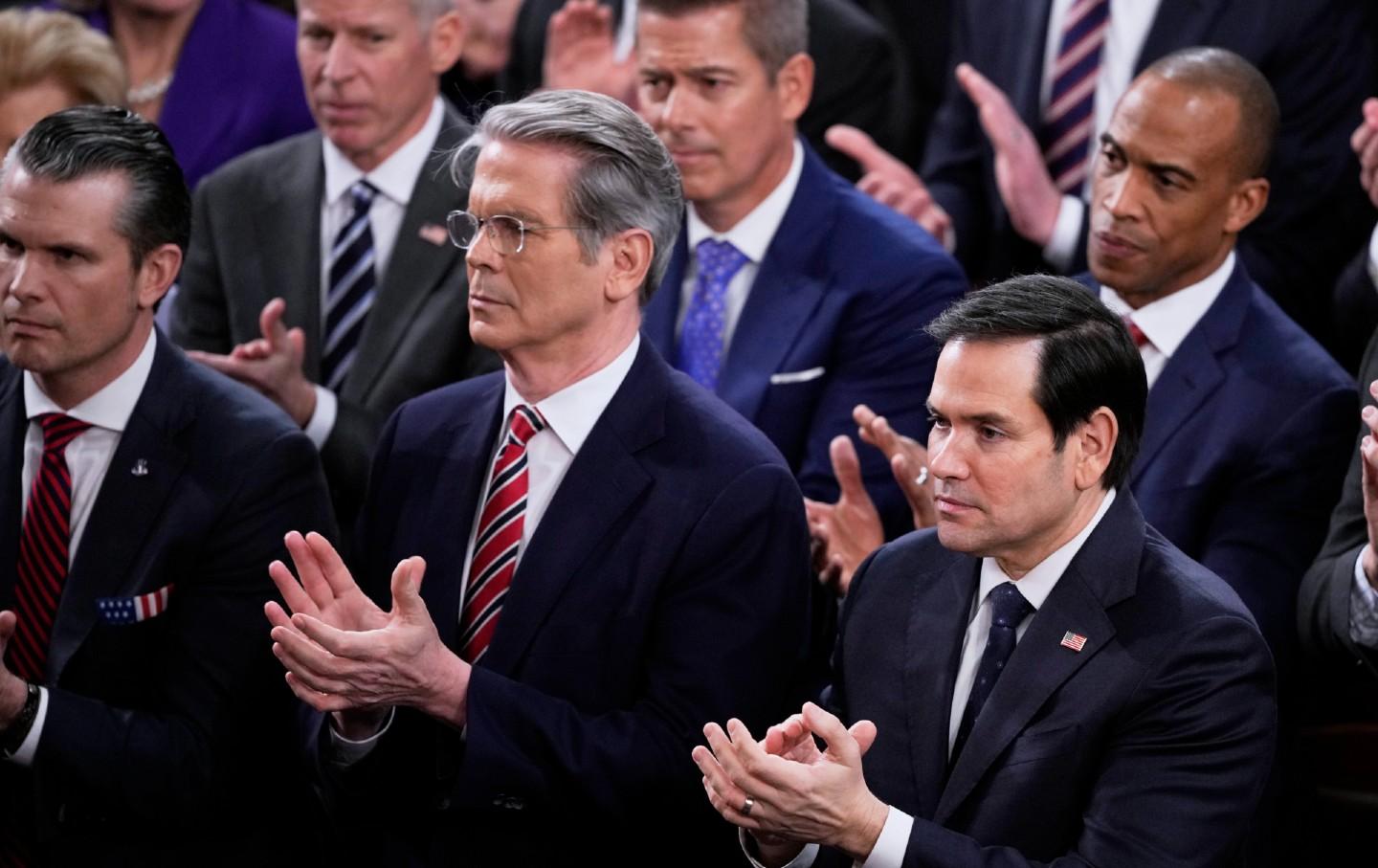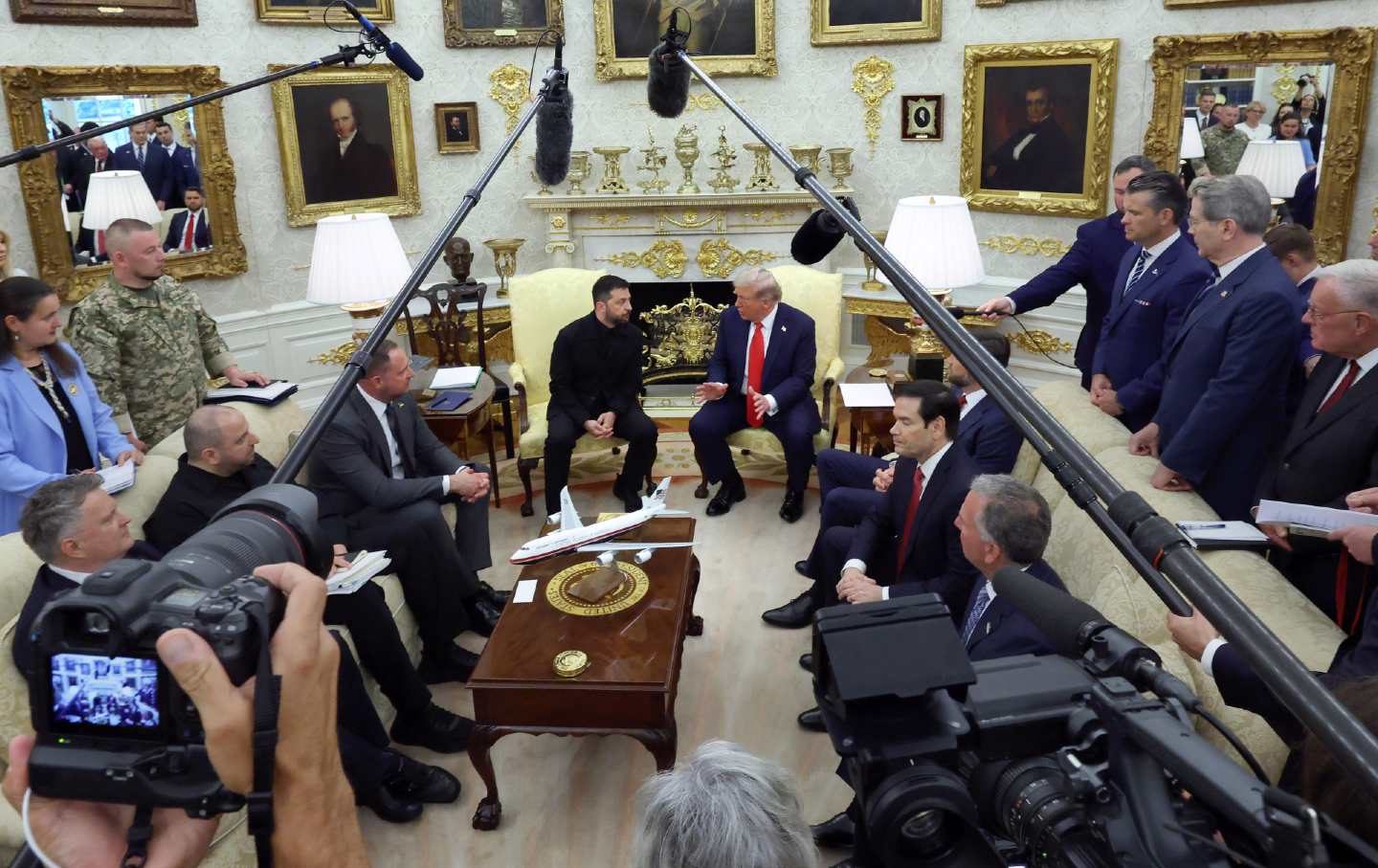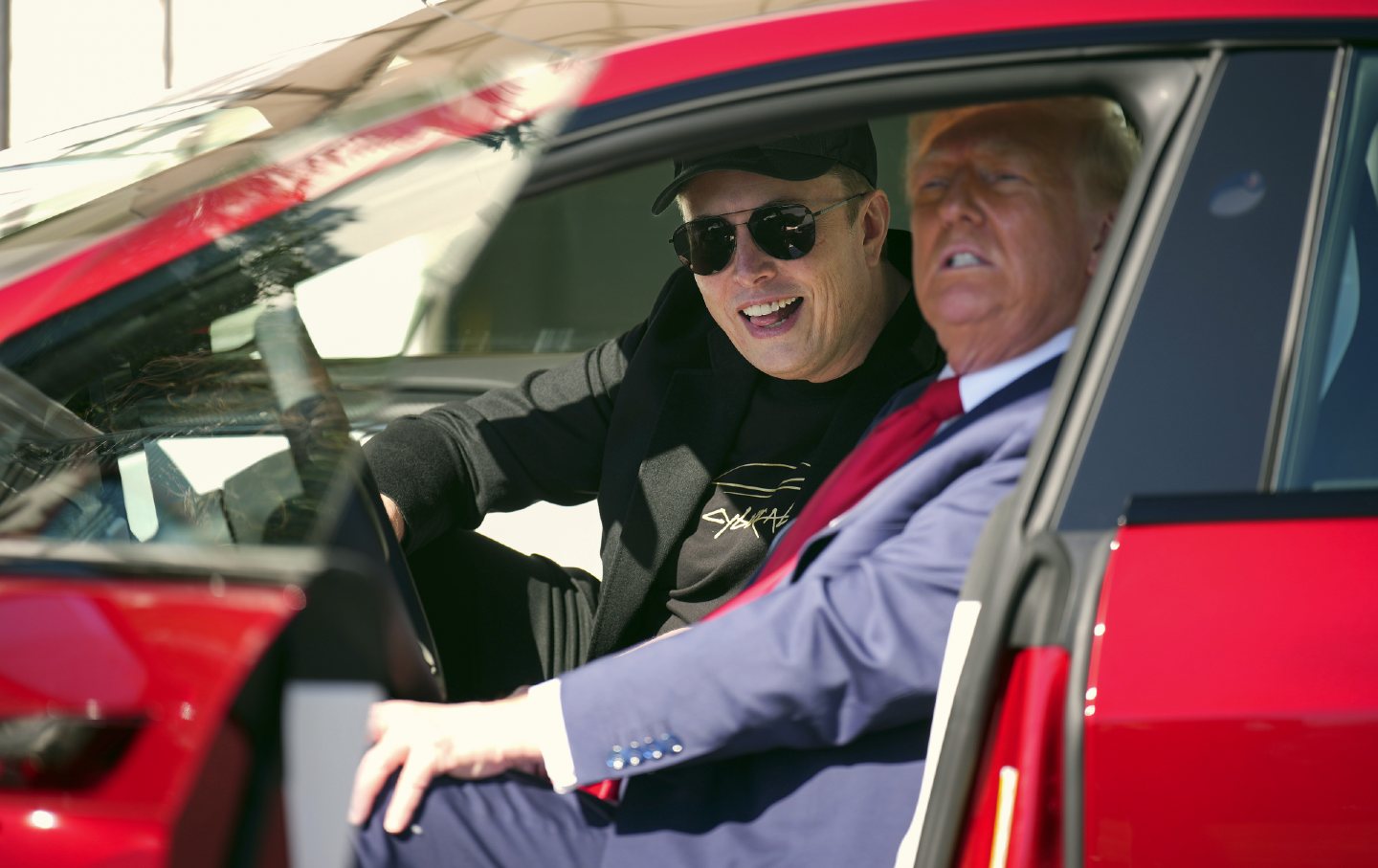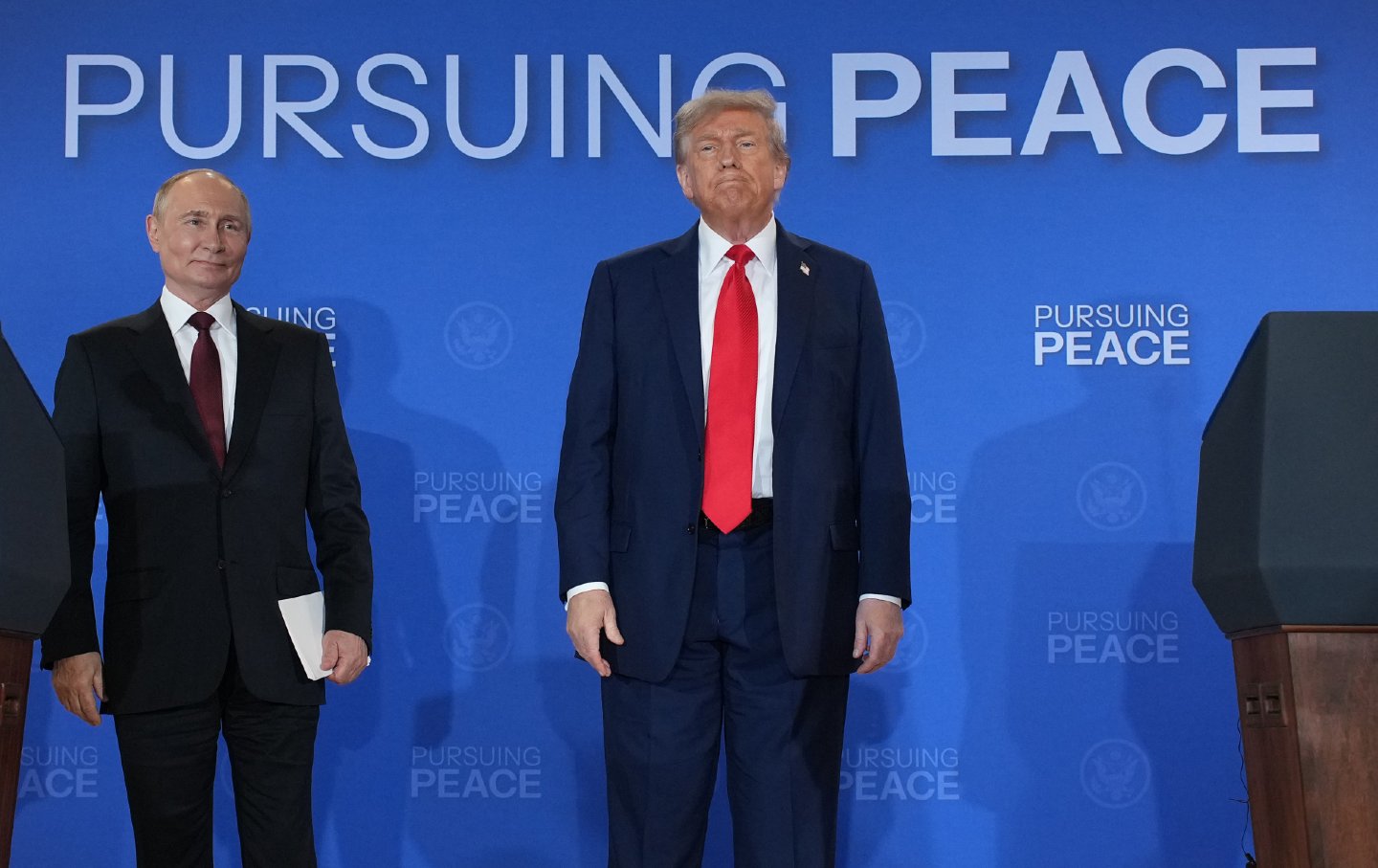Peace, Not Surrender for Ukraine
We now have a chance to seize the opportunity that we failed to seize after the end of the Cold War.

There are so many points on which to condemn the domestic and foreign policies of the Trump administration that just to list them would take an entire article; but the Ukraine peace process is not among them. If any Nation readers are apt to be swayed by all the hysterical talk of Trump’s “betraying” Ukraine, “serving Putin,” “abandoning Europe” and creating a “new Yalta agreement,” I would urge them to read the angry and fearful responses of Russian hard-liners to the US-Ukrainian call for a ceasefire. These Russian hawks do not see the latest ceasefire proposal as in Russia’s favor. They see it as a “treacherous” move by Washington and Kyiv to deprive Russia of the great victory for which they hope.
So far, the Trump administration’s approach, while undeniably crude, has also been undeniably effective. The Ukrainian government has been forced to abandon its impossible conditions for peace and to call for a ceasefire. Together with the resumption of US aid to Ukraine, this has placed the Russian government under huge pressure to compromise.
As Marco Rubio has said, “the ball is now in Russia’s court.” Now that the US is no longer seeking Russia’s defeat, if the Russian government sticks to its own impossible conditions, then it will run two great risks: that further Russian military advances will continue to be so slow, at such cost, and for so little gain that serious opposition to the war will emerge among ordinary Russians; and that Trump, deprived of his hope to be seen as a historic peacemaker, will himself swing towards implacable hostility to Russia.
That does not mean that the Russian government will simply agree to an early temporary ceasefire without preconditions—something that it has always rejected. Ambassador Yuri Ushakov, a top adviser to Putin, and one of the Russian negotiators with Washington, has said that “Russia’s goal is still a long-term peaceful settlement…[that] takes into account the legitimate interests of our country.… Steps that imitate peaceful actions, it seems to me, are of no use to anyone.”
Some things really do need to be settled (at least in outline) in advance of a ceasefire; otherwise the war will only resume later. Among them is the composition of a UN peacekeeping force. Russia has categorically rejected European peacekeepers, which it sees (rightly), as simply NATO by another name. If the Ukrainians and Europeans continue to try to insert this into a peace agreement, there will be no peace. Russia will however need to reaffirm publicly its agreement to Ukraine seeking membership in the European Union.
There will need to be a firm promise to suspend some sanctions against Russia, and on how to use the $300 billion in seized Russian assets to rebuild Ukraine (including the Russian-occupied territories). Both Russia and Ukraine will have to undertake not to change the ceasefire line by force. That will involve Russia giving up its hope of capturing the rest of the four provinces that it claims to have annexed, and Ukraine giving up the hope of recapturing its own lost territories. Any restrictions on Ukrainian arms will require an element of reciprocity, ideally in a wider framework of European arms reduction talks.
A peace agreement along these lines would not mean Ukrainian “surrender.” By far the greater part of Ukraine would remain independent, heavily armed for defense, and with a path (albeit one that is likely to prove very difficult) toward membership of the EU and integration into the West.
It is, of course, horribly difficult for the left in the United States and Europe to support anything that Trump does; but in the case of the Ukraine peace process, they should do so; for the alternatives are becoming clearer with every passing day: in Europe, a turn to something much more like the 19th-century “national liberalism” of Germany, Spain, or Italy: dedicated to certain forms of bourgeois “progress,” but strongly authoritarian and militarist, limiting or manipulating the vote to keep liberal elites in power, and legitimizing its rule largely through appeals to nationalism. In the case of the United States, this kind of liberalism will be turbo-charged with anti-Russian (and, for different reasons, anti-Muslim) hatred and paranoia. In the process, among all the other things already being thrown overboard to save money for increased spending on weapons is European action against climate change—a threat to Europe that dwarfs that from Russia.
Where this can lead is already apparent in Romania. However much one may loathe Calin Georgescu for his sympathy for Romania’s fascist regime of the 1940s and mock him for his conspiracy theories (including denial of the moon landings), it should be obvious that the means adopted by the Romanian establishment to disqualify him from running for president have been totally illegitimate and undemocratic, and have relied on the fabrication of a Russian plot where none in fact existed.
On that, at least, JD Vance’s lecture to the Europeans had a point. The EU has encouraged this attempt to nullify an election by one of its member states, and acquiesced in the suppression of the protests that have resulted. This path leads to dictatorship, supported by the EU and NATO in the name of resistance to Russia—perhaps rather like Greece under the military dictatorship of 1967–74, supported by the West as part of the Cold War with the USSR.
In the US, the Democratic Party will be locked into permanent hostility to Russia, justified by ever more outrageous exaggerations of the Russian threat to the US, and in alliance with the most stupid and retrograde elements of the US military, intelligence community, and security establishment. Since there is no sign as yet of the Democratic establishment reducing its commitment to Israel or its hostility to Iran and China, the Democratic Party would become in effect the party of US militarism and the pursuit of US global primacy by military means.
Before embarking on this disastrous course, Democrats should recall how the Cold War began, and how it ended. As with support to Ukraine to resist the Russian invasion of February 2022, the creation of NATO and the containment of the Soviet Union were necessary in response to Stalinist expansionism and tyranny; but the intellectual architect of containment, George Kennan, came to deplore the way in which it was increasingly defined in hyper-militarized terms, driven and justified by paranoid exaggerations of the Soviet menace. The result in the short term was McCarthyism; in the longer term, the creation of a US national security state and military-industrial complex that previous generations of Americans would have regarded as contrary to core American values and traditions.
Popular
“swipe left below to view more authors”Swipe →The Cold War ended thanks to Mikhail Gorbachev; and those of us old enough to remember that time should make it our business publicly to recall the adulation for “Gorby” that swept the West, and Gorbachev’s later bitter criticisms of the way in which the US and its European allies had helped to betray and destroy his vision of a “Common European Home” through the expansion of NATO and unilateral US acts of aggression, intervention, and wanton contempt for Russian interests (he also strongly condemned aspects of Putin’s regime). Kennan too strongly opposed NATO expansion in the 1990s.
Otto von Bismarck once said that making laws is like making sausages—one should not look too closely into how it is done. The same could be said about peace agreements. We now have a second chance to seize the opportunity that we failed to seize after the end of the Cold War, of a Europe at peace due to a security architecture that includes rather than excludes Russia, and free to devote its resources to the well-being of its citizens and of humanity, not to weapons. We should not reject that chance just because it is Donald Trump and Marco Rubio who offer it to us.
Take a stand against Trump and support The Nation!
In this moment of crisis, we need a unified, progressive opposition to Donald Trump.
We’re starting to see one take shape in the streets and at ballot boxes across the country: from New York City mayoral candidate Zohran Mamdani’s campaign focused on affordability, to communities protecting their neighbors from ICE, to the senators opposing arms shipments to Israel.
The Democratic Party has an urgent choice to make: Will it embrace a politics that is principled and popular, or will it continue to insist on losing elections with the out-of-touch elites and consultants that got us here?
At The Nation, we know which side we’re on. Every day, we make the case for a more democratic and equal world by championing progressive leaders, lifting up movements fighting for justice, and exposing the oligarchs and corporations profiting at the expense of us all. Our independent journalism informs and empowers progressives across the country and helps bring this politics to new readers ready to join the fight.
We need your help to continue this work. Will you donate to support The Nation’s independent journalism? Every contribution goes to our award-winning reporting, analysis, and commentary.
Thank you for helping us take on Trump and build the just society we know is possible.
Sincerely,
Bhaskar Sunkara
President, The Nation
More from The Nation

Israeli Soldiers Abused Me Before. I’m Terrified That They’ll Do It Again. Israeli Soldiers Abused Me Before. I’m Terrified That They’ll Do It Again.
Israel is invading Gaza City again. The trauma of what they did to me and my family during their last invasion haunts me every single day.

The Ukraine Peace Process Is Moving Quite Fast The Ukraine Peace Process Is Moving Quite Fast
Here are the openings—and obstacles.

Dismantling USAID Wasn’t Just Cruel—It Was Stupid Dismantling USAID Wasn’t Just Cruel—It Was Stupid
In an interconnected world, those who are alone, to use a favorite word of the president’s, are losers.

Trump Won’t Deliver Peace to Ukraine—or Anywhere Else Trump Won’t Deliver Peace to Ukraine—or Anywhere Else
No one can trust the United States when a fickle man-child controls its foreign policy.

Presidents Trump and Putin Must Seize the Moment in Alaska Presidents Trump and Putin Must Seize the Moment in Alaska
The war in Ukraine is a regional security and humanitarian tragedy, but regarding nuclear weapons, Washington and Moscow stand to benefit from working together.

The Bookstores Bridging Divides in Israel The Bookstores Bridging Divides in Israel
People of goodwill on either side of the horror find unity in the search for a good read.


